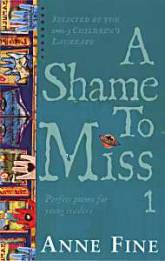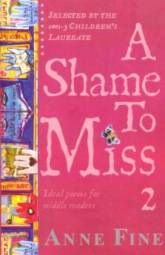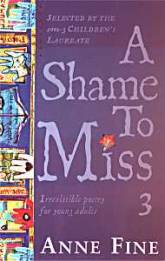A Shame to Miss
![]() I suddenly noticed how many young people I was coming across who loved reading, and claimed to like poetry, but who seemed never to have come across some of the best - and best-loved - poems for their age-group. Indeed, rather more than we would like to think had only ever been introduced to the more "jokey" sorts of doggerel. And even those who came across wider collections had still missed an awful lot of wonderfully appealing poems. It all seemed such a shame.
I suddenly noticed how many young people I was coming across who loved reading, and claimed to like poetry, but who seemed never to have come across some of the best - and best-loved - poems for their age-group. Indeed, rather more than we would like to think had only ever been introduced to the more "jokey" sorts of doggerel. And even those who came across wider collections had still missed an awful lot of wonderfully appealing poems. It all seemed such a shame.
And that's when I decided to put together three collections of poems it would be "A Shame to Miss". The first is for children of 6 - 10, the second would be perfect for anyone in between 8 and 12. And the third is a rather more demanding collection of poems that have a particular interest or appeal to early and middle adolescents.
In the two younger collections I've added, as easy-going footnotes, anything I think a young reader needs to know to "get" the poem first time. I know I'll be handing plenty of copies about - and I'm not quite sure yet whether it's because I care about children or I care about poetry. I suppose it must be a mix of both.![]()

Click on the covers on the right to find out more about A Shame to Miss. Below, what some reviewers said about these books:
 Review
Review
"Making children think poetry is "cool" is almost as difficult as convincing them of the absolute necessity of recorder practice. It can be done, but not by the likes of normal parents.
"Which is precisely why we need children's laureate Anne Fine. Her three-book selection of poems, A Shame to Miss, published this week by Corgi at £4.99 each, is as warm-hearted and unpretentious as she is herself.
"Carefully aimed at three different age ranges - juniors, young adults, and the elusive 9-11s in between - the selection is also marvellously eclectic. The notes offer not only necessary explanations but engaging quirkiness throughout. Of And Did Those Feet in Ancient Time she notes: 'Blake's poetry is 'mystical' (religiously weird) ... Most people know this as a hymn, and sooner or later you'll have to sing it at someone's funeral.' A sad amen to that."
The Browser in The Scotsman
Writing in Education review
"Anne Fine is like the best kind of parent or teacher who provides just enough information to make poems comprehensible to young readers but otherwise lets the poets speak for themselves. Her comments feel intimate and personal but never patronising ("this is what we call a spoof or parody", a soliloquy is "talking to yourself out loud"). Definitions are given for unusual words - the footnote to George Barker's The Cheetah, My Dearest, Is Known Not to Cheat describes a mandrill and adds "I'm afraid George has spelt it wrong" - a respectful, authoritative comment which serves to make the process of poem-making and reading more interactive and interesting."
Victoria Field




